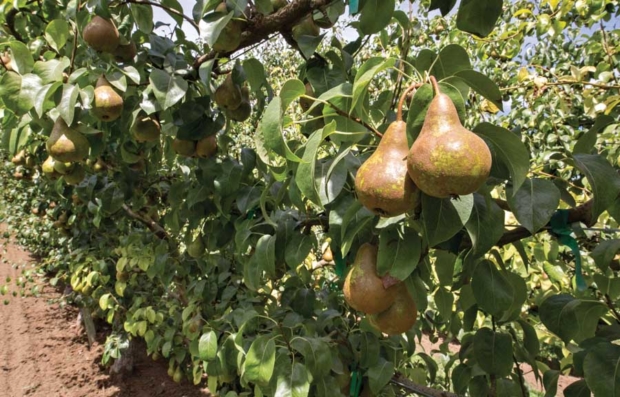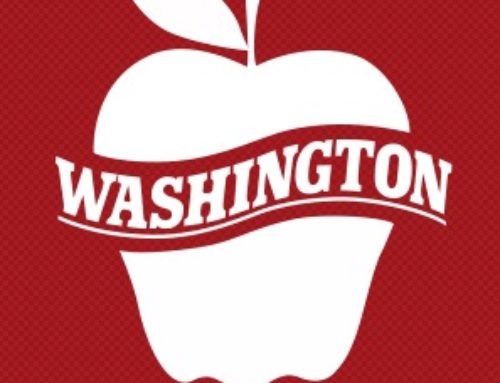
An organic pear orchard near Mesa, Washington on July 15, 2015.(TJ Mullinax/Good Fruit Grower)
Pear Bureau Northwest is out of the organic pear promotions business, after nearly all of the region’s organic pear packing companies opted out of their promotion assessments.
Meanwhile, a proposal for a national checkoff program has organic producers across the entire country considering unifying under a wide umbrella of products.
Under a provision of the 2014 Farm Bill that took effect this year, organic growers were allowed to opt out of promotion assessments that previously had been required.
The so-called “opt-out” or “exemption” clause applies to all 30 marketing orders but affects pears most among Northwest fresh fruits.
In June, packers representing 93 percent of the Northwest’s organic pear production chose to cease paying organic promotion assessments to Pear Bureau Northwest, which generically promotes Northwest pears under a federal marketing order through advertisements, in-store samples and other marketing activities.
That would leave the Pear Bureau with less than $3,000 for organic promotions next year.
As a result, the bureau’s board of directors has decided to scrap organic promotions activities in the coming season and ask the remaining six packing companies to leave, too.
Those that didn’t get their paperwork in on time will receive a refund at the end of the season, said Kevin Moffitt, president of Pear Bureau Northwest, in an email to Good Fruit Grower.
“This is all uncharted territory,” he said.
The Northwest produces roughly 1 million 44-pound box equivalents of organic pears, about 6 percent of the Northwest’s total volume. Shippers pay an assessment of 38.5 cents per box for both.
The exemptions will not affect assessments and promotions of conventionally grown pears. The opt-outs also do not apply to a 3.1-cent per box research assessment and 3.3-cent administrative assessment. All producers, organic or conventional, will continue to pay those.
Organic vs. conventional
Early in the process, several large organic shippers had considered remaining in the marketing order under the banner of teamwork. But over time, the “opt out” issue began to unveil a growing wedge between producers of organic and conventional agricultural products.
Discussion grew heated at times during the pear industry’s annual meetings in Portland, Oregon, in June.
“We disagree with the concept that pears are pears,” Ken Hembry, general manager of Peshastin Hi-Up, said in the meetings. “We feel there’s more in common between organic pears and organic apples than between organic pears and conventional pears.”
The Wenatchee Valley company was one of the first two companies to opt out. Stemilt was the other. The two shippers account for roughly 26 percent of all organic pear volume in the Northwest. The Chelan Fruit Growers Cooperative was among the remaining 7 percent that originally chose to pay the assessment.
Consumers don’t shop for pears by brand, said Mac Riggans, director of marketing for Chelan Fresh, the sales arm for Chelan Fruit Growers. “The rugged individualism of this industry is what makes it so great, but the cohesiveness that you get by cooperation is what gives you the united face to the consumer,” Riggans said.
The organic checkoff proposal
Organic producers may separate even more in the coming years.
The national advocacy group Organic Trade Association has applied with the U.S. Department of Agriculture for a promotional checkoff program to create a marketing and consumer education campaign for all organic commodities, including grains, vegetables and other crops, as well as fruit.
Promotional checkoffs in the past have spawned the well-known advertising tag lines, “Beef. It’s what’s for dinner,” and “Got milk?”
The organic checkoff proposal calls for an assessment of one-tenth of 1 percent of net organic sales to raise more than $30 million a year for promotion and research related to organic commodities.
The Organic Trade Association was one of the primary authors of the “opt-out” clause so many pear shippers used this spring.
The association argues in promotional material and their USDA application that organic producers need their own identity and consumer education campaign. An example: telling people the difference between organic and natural labels.
Organic Trade Association officials did not respond to interview requests.
The proposed checkoff is months, if not years, down the road. The U.S. Department of Agriculture first must approve it, then a majority of organic stakeholders must vote in favor.
Fruit industry leaders are uncertain of their position. Several years ago, an effort to combine fruit and vegetable growers in a national campaign to promote them as part of a healthy diet didn’t even make it to an official application with the USDA.
“When you start bringing in so many different categories and commodities and everybody’s self-interests and strategies, it becomes very difficult to unify a group of that size all putting their oars in the water the same way,” said Howard Nager, vice president of marketing for Domex Superfresh Growers, a Yakima, Washington, fruit sales company that represents about 25 percent of the Northwest’s organic pear volume. •






Leave A Comment